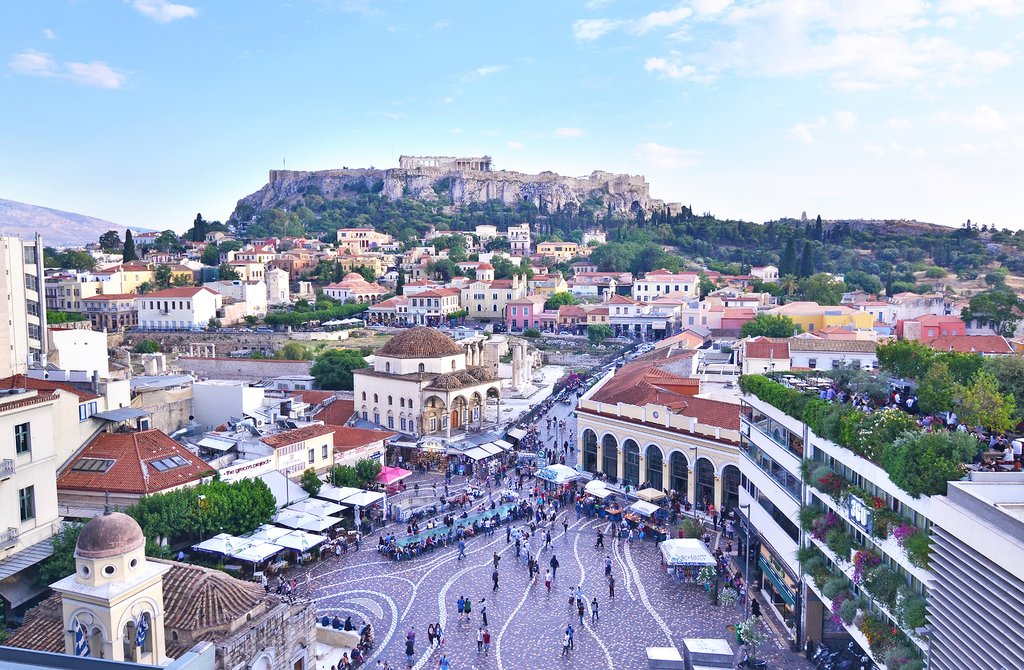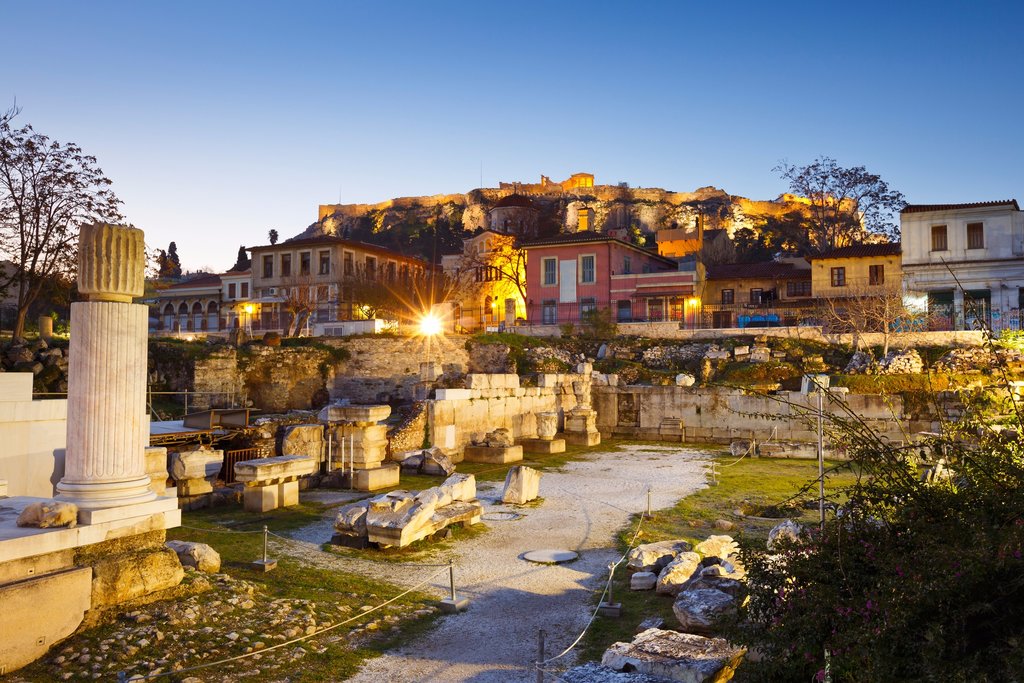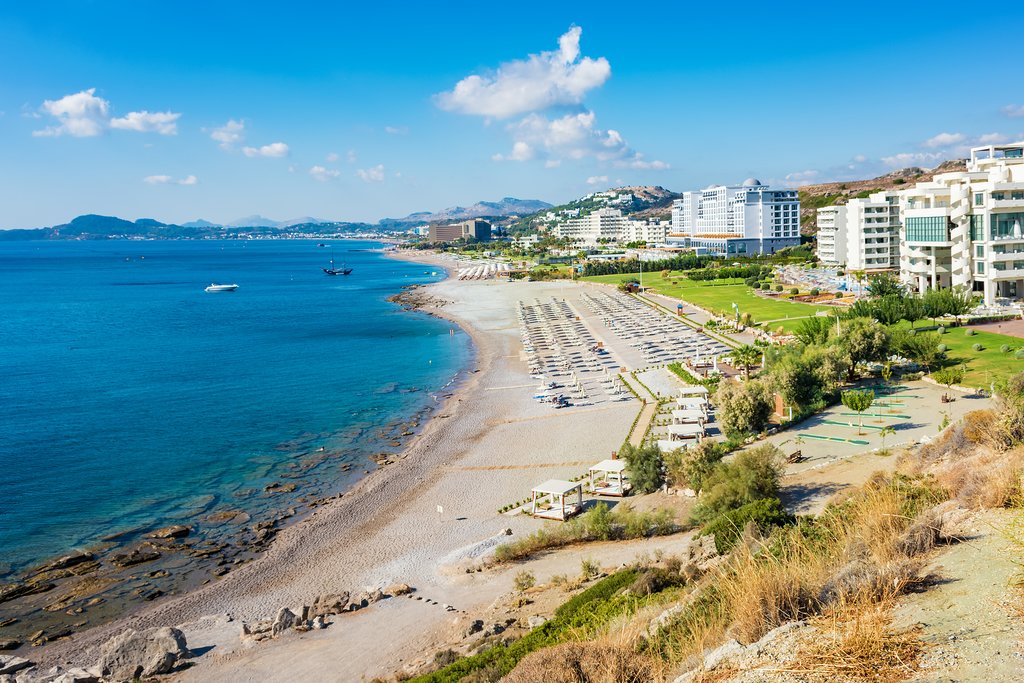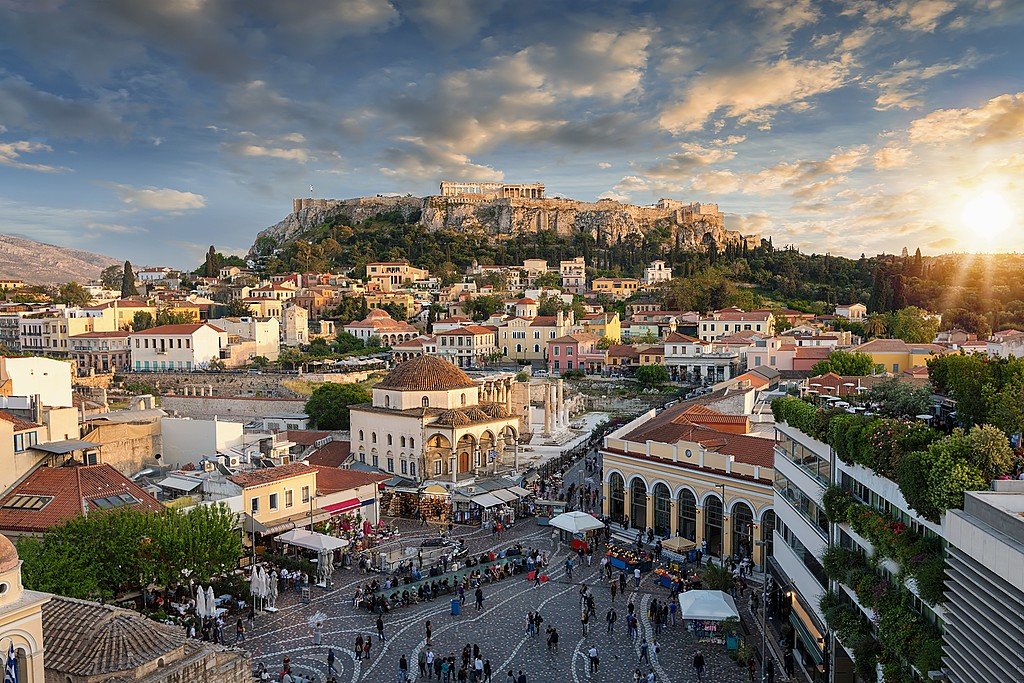Highlights
- Explore the medieval Old Town of Rhodes
- Walk the labyrinth of Knossos
- Sample the vines of Cretan wineries
- Taste a food panorama on Corfu
Brief Itinerary
| Day | Highlights | Overnight |
|---|---|---|
| Day 1 | Arrive in Athens, Welcome Dinner | Athens |
| Day 2 | Acropolis and Ancient Greek Mythology Tour | Athens |
| Day 3 | Travel to Rhodes, Medieval Tour | Rhodes |
| Day 4 | Eastern Beaches of Rhodes | Rhodes |
| Day 5 | Orange Valley Hike & Ancient City of Lindos | Rhodes |
| Day 6 | Monolithos Castle & Villages of Rhodes | Rhodes |
| Day 7 | Travel to Heraklion, Palace of Knossos and Archaeological Museum | Heraklion |
| Day 8 | Olive Oil Tasting at Archanes | Archanes |
| Day 9 | Wine Roads Tour From Archanes | Archanes |
| Day 10 | Travel to Corfu, Food Tour | Corfu |
| Day 11 | Palaces of Corfu | Corfu |
| Day 12 | Return to Athens, Sunset at Cape Sounion | Athens |
| Day 13 | Depart Athens |
Detailed Itinerary
Day 1: Arrive in Athens, Welcome Dinner

Welcome to Greece! You'll begin your trip in Athens, home to both the iconic Acropolis and so much more. The mythology of this spectacular city precedes it, with towering temples to Classical deities and the ruins of ancient marketplaces rubbing shoulders with lively nightlife, crowded flea markets, and contemporary cuisine. Make the most of your time in the city at some of these spots:
- Check out the views of the can't-miss Parthenon. (Pro tip: The Parthenon is the temple, the Acropolis is the hill.) This temple to Athena has enchanted visitors since its construction was completed in 438 BC. It's probably the first thing that comes to your mind when you think of ancient Greece and is visible from many of the city's high points.
- Stop at the sprawling National Museum for a crash course in ancient iconography. Be sure to seek out the room housing the Antikythera mechanism, essentially an ancient astronomical computer.
- Visit a smaller archaeological site at the Tower of the Winds, then stroll down neighboring pedestrian Aiolou Street to stop at shops and cafes.
- Find your perfect souvenir or sun hat in the busy stalls of the Monastiraki flea market.
In the evening, you'll sit down to enjoy either a welcome dinner with views of the Acropolis or wine tasting in a bar in downtown Athens.
Day 2: Acropolis and Ancient Greek Mythology Tour

Experience the ancient stories surrounding you with today's guided mythology tour. You'll meet your guide and storyteller at the Temple of Olympian Zeus, then head to landmarks around the city including the Acropolis, ancient cemetery at Kerameikos, and the Agora. The myths that founded the city and are featured in its retellings for generations will accompany as you go, with stories of Zeus, Athena, Poseidon, Dionysus, and more. Hear both the stories themselves and the historic facts behind them, adding resonance to the archaeological ruins you will visit during this four-hour tour.
Make your way over to explore the Acropolis Museum on your own after your tour (or join a guide if you'd prefer). Named one of the ten best museums in the world by National Geographic, this modern museum houses a multitude of artifacts removed from the hill of the Acropolis for safekeeping to provide insight into ancient religious practices and daily life. Linger for lunch in the museum's cafe, with views of the artifacts' former hilltop home.
As night falls, you may be able to visit the Athens Observatory to learn about the constellations overhead and take a look through the telescope. Its hours vary seasonally and by day of the week.
Day 3: Travel to Rhodes, Medieval Tour

Depart for Rhodes, the largest of the Dodecanese islands, after your breakfast. The UNESCO World Heritage-designated Old Town of Rhodes sits inside a complete medieval city and highly preserved castle. Its shape today was constructed mainly between 1309 and 1522 when the island was occupied by the Knights of St. John.
Your guide will take through the streets and their history, including the city's role as the gateway to the Aegean Sea and its trade routes, construction of the defensive walls and the sieges and earthquakes they've withstood, and the Byzantine fortress at the highest part of town. You'll stop at the Palace of the Grand Master of the Knights and medieval clock tower as you make your way through the 11 gates and numerous bastions and towers.
If you spend your evening on the seafront later, don't forget to stop at the point where the Colossus of Rhodes, one of the seven wonders of the ancient world, once stood.
Day 4: Eastern Beaches of Rhodes

Visit the eastern half of the island today, where you can discover some of the first beaches that made Rhodes famous. Kalithea and Faliraki beach are some of the most popular, drawing plenty of visitors to their sunbed-lined shores and warm waters.
Keep the beach day going at one of the coastal restaurants. Or, if you've gotten sufficient time in the salt, spend your evening back in town exploring the Street of the Knights. The labyrinthine Rhodes old town is ideal for getting lost amid the stone streets that have been standing for centuries.
Day 5: Orange Valley Hike & Ancient City of Lindos

Start your day with a guided hike through Rhodes' island landscape. Pine and cypress trees will accompany you along your 5-mile (8 km) trail, starting in a rocky gorge that opens up to well-tended hillsides. River frogs and crabs may peek out from underwater rocks in the stream along the way. You'll pass through olive groves where you can stop and smell the local herbs, then over low banks and stone walls to the island reservoir, bordered by the ruins of a small village. Climb up a hill to take in the views from the Kammiri Monastery before you descend back through the pine forest.
After your trek, visit the fishing village of Lindos, known for its hilltop acropolis. The site was home to a temple to Athena in 300 BCE, and was one of the island's major Greek and Phoenician trading centers during the Classical era. The temple was later partially incorporated into the 14th century fortress built by the Knights of St. John to defend the region against the Ottomans. Stop at the Bay of St. Paul on your way out to take in the Aegean sea views, or any of the other coves along the coast.
Chat with a local specialist who can help organize your trip.
Day 6: Monolithos Castle & Villages of Rhodes

Start your morning off with a climb up to the medieval castle of Monolithos ("single rock"). Perched atop its namesake rock more than 300 feet (100 m) off the ground, this castle has never been conquered since its construction in 1480. It was built by the Knights of Saint John to protect the island from attack and now provides panoramic views from atop its slippery steps.
Take your time on your way back to Rhodes Town and make a side detour or two to a few smaller villages. The vineyards of Embonas make an ideal lunch stop, with a village full of wine-making facilities to pair with your lunch. You can also visit the village of Prophete Elias, which is best known for its Italian chalets, especially the Villa de Vecchi once built for (but never inhabited by) Mussolini.
Day 7: Travel to Heraklion, Palace of Knossos and Archaeological Museum

Travel to Heraklion in the morning, the capital of Crete. Once you've settled in, you'll venture out to tour the 3,500-year-old Minoan palace of Knossos, a sprawling maze of royal chambers, grand staircases, storerooms, and workshops. The throne room is still in place with the original throne, and replicas of many of the frescoes have been restored to the walls. This evocative Bronze Age site is believed to be Europe's oldest city, and you'll learn all about its history and mythology with your guide. It was once home to mythical King Minos, along with the famous Minotaur of Greek mythology.
Take a break for lunch and a stroll through the streets of Heraklion. You'll make your way to the Archaeological Museum, home to one of the largest collections of Minoan artifacts in the world, for the second half of your guided tour.
Continue around the old city's medieval streets in the evening, with architecture representing the island's Venetian past. Highlights include the elegant arches of the Loggia, now in use as the town hall, and the Koules Venetian fortress along the harbor walls. A pleasant pedestrian street in the Old Town connects the port area with the Lions' Square and its Venetian fountain. Don't miss "mama's food" at Anchorage Traditional Mezedopolio nearby.
Day 8: Olive Oil Tasting at Archanes

Olive oil is one of the keystones of Greek cuisine, and you'll get a hands-on look at its process with today's tour. Visit an olive farm and olive oil mill to learn about the many facets of olive harvesting, including the key role of timing and various harvesting methods. Taste the oil while you hear the stories of the owners of this family business and learn about the many uses of this ingredient.
The village of Archanes is also known for its raki, a traditional Cretan grape-based spirit used a welcome gesture for guests, appetizer, digestif, and more. If you're in town during harvest season, don't miss the kazanamata feast to celebrate the first raki of the season.
Day 9: Wine Roads Tour From Archanes

Drive through the Cretan countryside to sample up to 10 different wines on this tour. You'll start at the Lyrarakis Estate, where you'll take a walk through the vines to learn about their viticulture and grape harvesting practices. Then head down into the cellar to see the aging process in progress, and up to the tasting area to sample five of their award-winning wines..
Make your way through the vineyard and olive-filled region of Peza to the village of Choudetsi, home of your next stop. At the Rhous Winery, the owners and oenologists will take you through the vineyards and winery building. They'll explain their wine-making methods, from vine planting and grape selection to bottling. After a stop in the cellar, you'll taste five more wines to cover the full Cretan wine spectrum.
Top it off with lunch in a family-owned Cretan restaurant, along with half a bottle of wine per person to drink to your day's adventure.
Day 10: Travel to Corfu, Food Tour

In the morning, you'll head to the coast of the Ionian Sea as you travel to the island of Corfu. Watch for the many species of marine mammals that call the surrounding waters home once you've arrived, and see why Odysseus was able to recuperate from his mythological journeys here.
The city sits between its two guardians of the Old Fort and New Fort. The former was built in the thirteenth century and is surrounded by a seawater moat. It hides a slew of iconography, including the Porta Sopranza, winged lions of Saint Mark, and the Doric-inspired Church of St. George behind its walls. The New Fort on the northwestern border, meanwhile, boasts cubist military architecture.
Eat your way around the Old Town after your arrival with a guided food tour. You'll spend three hours sampling everything Corfu has to offer, noticing its traditional roots and Italian influence along the way. Meet the players of the local food scene as you learn about the history of Corfiot food and ingredients and visit the open-air markets. Your samples will include loukomades (fried dough with honey), spinach and cheese pies, kumquats, cold cuts, and seafood mezze, along with ingredients like traditional butter and cream, olive oil, and plenty of ouzo to wash it down.
Don't leave the Old Town at the end of your tour, but instead spend some time walking off all that food around this UNESCO World Heritage site. Look up to see the crisscrossing balconies indicative of Corfu's Neapolitan influence or have a seat in Spianada Square to watch the city life go by.
Day 11: Palaces of Corfu

Corfu has been known for its aristocratic elegance, home to many royal families over the course of its history. Today's 6-hour guided tour takes you to their former homes, complete with scenic surroundings and views of the Ionian Sea.
The first stop is the Achilleion Palace built by Princess Sisi, empress of Austria. The empress was known for her love of beauty and greatly admired Greek mythology. The palace is set up to honor Achilles and her perception of him as a character who represented human strength and vulnerability.
Next up are the Old Palaces, also known as the Palace of Saints Michael and George. These palaces were built by the British in the Roman architectural style, with a complex of halls and buildings and formal gardens. Originally intended to house the British Lord High Commissioner of the Ionian Islands, they're now home to the Corfu Museum of Asian Art along with two other art galleries.
Wrap up with the Mon Repos Palace, situated atop a hill that archaeologists believe was once home to the ancient city of Corfu. The palace was built by a British commissioner as a gift to his Corfiot wife and inspired Princess Sisi to build her own palace.
Spend the evening enjoying one of Corfu's delicious local specialties in a restaurant in the Old Town, such as sofrito, thin slices of fried veal with white sauce made of garlic, vinegar and freshly ground parsley, or pastitsada, thick pasta with rooster or beef.
Day 12: Return to Athens, Sunset at Cape Sounion

Return to Athens in the morning. After you've settled back into the city, you'll be transferred down to the Athenian Riviera, full of both history and stunning island views. Your adventure will take you along the coast to visit the Temple of Poseidon, while being provided with historical background on the way. The views overlook the Saronic Gulf, with one of the best sunset views Greece has to offer. Sip a complimentary beverage and take in the sunset while you listen to music and immortalize the moment with a Polaroid-style photo.
You'll be transferred back to your lodging in the evening just in time for a late (Greek-style) dinner. Or, if you're not ready to call it a night, you can request a drop-off at some of the most popular beach bars to dance until the sun comes up.
Day 13: Depart Athens

Time to say farewell to Greece. Enjoy your final Athenian breakfast and sneak in some last-minute exploring before your transfer to the airport.


